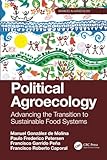Political agroecology: advancing the transition to sustainable food systems / Manuel González de Molina, Paulo Frederico Petersen, Francisco Garrido Peña, Francisco Roberto Caporal
González de Molina, Manuel [autor] | Petersen, Paulo Frederico [autor] | Garrido Peña, Francisco [autor] | Caporal, Francisco Roberto [autor].
Tipo de material: Libro
impreso(a)
Series Editor: Boca Raton, Florida, United States: CRC Press, c2019Descripción: 217 páginas : fotografías, ilustraciones ; 24 centímetros.Tipo de contenido: Texto Tipo de medio: Sin medio Tipo de portador: VolumenISBN: 1138369225; 9781138369221.Tema(s): Agroecología
Libro
impreso(a)
Series Editor: Boca Raton, Florida, United States: CRC Press, c2019Descripción: 217 páginas : fotografías, ilustraciones ; 24 centímetros.Tipo de contenido: Texto Tipo de medio: Sin medio Tipo de portador: VolumenISBN: 1138369225; 9781138369221.Tema(s): Agroecología| Tipo de ítem | Biblioteca actual | Colección | Signatura | Estado | Fecha de vencimiento | Código de barras |
|---|---|---|---|---|---|---|
| Libros |
Biblioteca Villahermosa
Texto en la configuración de la biblioteca Villahermosa |
Acervo General | 577.55 P6 | Disponible | ECO050006505 |
Incluye bibliografía páginas 167-193 e índice: páginas 195-201
Introduction.. Chapter 1.. Theoretical Foundations of Political Agroecology.. Chapter 2.. The Industrialization of Agriculture and the Enlargement of the Food Chain.. Chapter 3.. A Regime on the Road to Collapse.. Chapter 4.. Cognitive Frameworks and Institutional Design for an Agroecological Transition.. Chapter 5.. Scaling Agroecology.. Chapter 6.. The Agents of the Agroecological Transition.. Chapter 7.. The Role of the State and Public Policies
Political Agroecology is the first book to offer a systematic and articulated reflection on Political Agroecology from the Agroecological perspective. It defines the disciplinary field responsible for designing and producing actions, institutions and regulations aimed at achieving agrarian sustainability. In short, it aims to build a political theory that makes the scaling-up of agroecological experiences possible, turning them into the foundation of a new and alternative food regime. The book proposes theoretical, practical and epistemological foundations of a new theoretical and practical field of work for agroecologists: Political Agroecology. It establishes a framework for a common agroecological strategy, covering the different levels of collective action and the different instruments with which it can be developed. This will be essential reading for agroecologists, environmentalists, farming and food communities, and an ideal textbook for advanced agroecology courses in universities. Key features: • Offers a unique state of the art on this fundamental new topic: Political Agroecology. • Presents a complete introduction to the political and institutional aspects of Agroecology, covering the whole food system. • Offers an important tool for searching agrarian sustainability. • Provides a broad epistemological, theoretical and methodological focus, exploring the connection between the different levels and scales involved in agroecological theory and practice. eng
